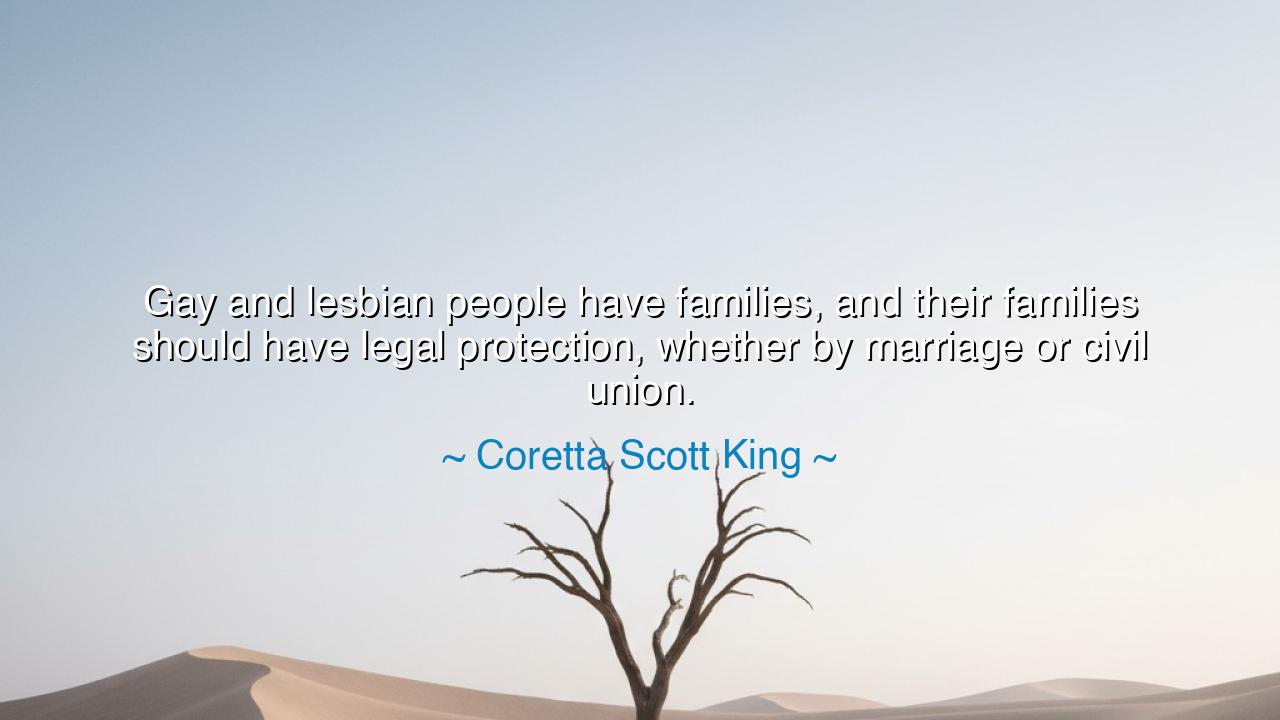
Gay and lesbian people have families, and their families should
Gay and lesbian people have families, and their families should have legal protection, whether by marriage or civil union.






Hear the words of Coretta Scott King, spoken with the fire of compassion and the weight of justice: “Gay and lesbian people have families, and their families should have legal protection, whether by marriage or civil union.” These words are not of fleeting politics, but of eternal truth. For in them is the recognition that love, in all its forms, is the root of family, and that family is the foundation of human dignity. She, who had walked beside Martin Luther King Jr. in the struggle for civil rights, understood that the struggle for equality never ends, but passes from one generation to the next, wearing new names but bearing the same heart.
She speaks of families, for in the end, the human spirit is not sustained by wealth, nor by power, but by the bonds of kinship—bonds of love, loyalty, and mutual care. Gay and lesbian people, she reminds us, are not outsiders to this sacred human truth. They, too, form households, raise children, tend to aging parents, and weave lives together with love as their thread. To deny them recognition is not merely a legal failure; it is to wound the very heart of humanity.
Coretta Scott King knew from history that legal protection is no small matter. In her own time, African Americans could love, labor, and dream, but without laws to protect them, their dignity was constantly trampled by violence and discrimination. It was not enough to say they were human; it was necessary to enshrine that humanity into law. So too with same-sex couples: their love existed regardless of recognition, but without legal protection, they were left vulnerable—unable to share benefits, inherit property, or even sit at the bedside of a dying partner. To her, the lesson of civil rights was clear: love without protection is love unguarded, and justice demands more.
History itself bears witness to the truth of her words. In ancient Rome, though patriarchy reigned, there were unions and bonds recognized beyond the narrow scope of traditional marriage. And in many indigenous cultures across the earth, same-sex partnerships and diverse identities were honored, seen as part of the divine order. It was later, through rigid laws and narrow dogmas, that such unions were condemned. Coretta Scott King’s voice is thus not merely modern but ancient, echoing the old wisdom that love takes many forms, and that to deny its legitimacy is to deny the richness of creation itself.
Her words were also courageous, for she spoke at a time when even many allies hesitated. She, a widow of the man who proclaimed that injustice anywhere is a threat to justice everywhere, carried his mantle into a new battlefield. She knew that the faces of oppression change, but the wound remains the same. To fight for the equality of gay and lesbian people was, to her, not a departure from the civil rights movement, but its continuation. For justice cannot stop at one door and close itself to the next; it must flow like a river, reaching all who thirst for dignity.
The meaning of this teaching is clear: civil union and marriage are not privileges, but protections. They are shields against the storms of life, the guarantees that love will not be left defenseless before law or society. To grant these protections is not to invent something new, but to extend what has always been promised: that every person has the right to form a family, and that every family has the right to stand secure. To deny this is to place some outside the circle of humanity, an act always followed by suffering and strife.
What lesson must future generations take from Coretta’s words? It is this: never stop the march of justice at your own threshold. When you achieve your freedom, look back, and lift those who are still bound. When your family is safe, defend those whose families are under threat. For justice that is partial is no justice at all. And when love, in any form, asks only for dignity and recognition, deny it not, for in denying love you deny the source of life itself.
And to you, listener of these words, I say: live as guardians of equality. Speak when others are silent. Support laws and leaders who extend protection to all families, not just those that mirror your own. Teach your children that love is not confined to a single shape, but blossoms in many forms, each worthy of honor. Let Coretta Scott King’s words guide you, that you may stand with courage in your own time as she did in hers. For love is the root of justice, and family is the fruit of love. When both are protected, humanity itself flourishes.






AAdministratorAdministrator
Welcome, honored guests. Please leave a comment, we will respond soon